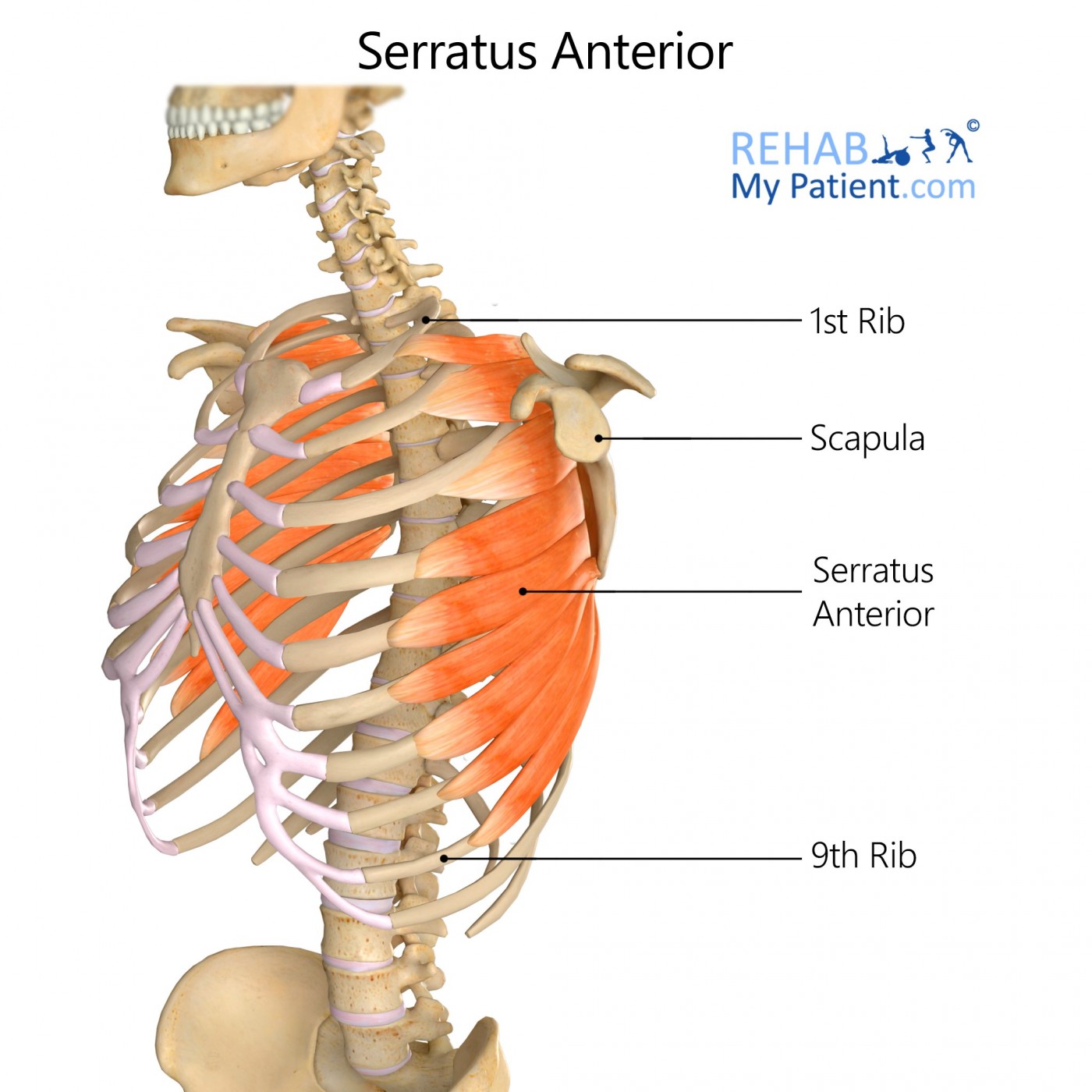
General information
The Serratus anterior is a muscle originating along the surface of the first to eighth ribs along the chest sides. It inserts down the entire anterior length in the medial border of the scapula.
Literal meaning
The front saw.
Interesting information
Pain radiating around the rib cage is often attributed to a number of health complications, which are often correlated to hyperextension. If suffering from pain in the side, it is imperative that medical attention is sought to determine whether treatment is required for sprains or strains to the muscle. This large muscle covers the rib cage and the side of the torso all the way up to the shoulder. When injury to the muscle occurs, it is common to experience a large amount of pain in the area, difficulty breathing, and development of pain along the fingers and arm.
Muscle relaxers, heat packs and anti-inflammatory medications are commonly used to treat sprains. Since breathing can become laboured, anxiety is common, which may be treated with anti-anxiety medications. Under proper care, the injury can heal within four to six weeks without needing aggressive treatment.
Origin
Anterolateral surface for the first eight to nine ribs located just anterior of the mid-axillary line.
Insertion
Anterior surface for the medial margin in the scapula out of the superior angle of the inferior angle.
Function
Abduction for the scapula.
Upward rotation in the glenoid cavity and the descending inferior fibres that pull the inferior angle in the scapula forward to help rotate the glenoid cavity upward.
Helps to completely raise the arm vertically above the head.
Helps to stabilize the scapula and the glenoid cavity associated with it for improving functional efficiency for the muscles that are working at the shoulder joint.
Nerve supply
Long thoracic nerve C5-C7.
Blood supply
Superior thoracic artery.
Lateral thoracic artery.
Thoracodorsal artery.

Relevant research
Proper functioning of the serratus anterior plays a pivotal role in stability and movement for the scapula, as well as the upper limb and the glenohumeral joint. Thanks to the unique anatomy of this muscle, it makes for direct measurements of fatigue properties nearly impossible. In the study, it is described for the first time the indirect measurements of fatigue manifestations in the serratus anterior. There were 88 volunteers tested, ages 29 to 35 years of age. Signals were analysed to obtain the rate of fall of median EMG frequency and the rate of rise of amplitude. Both exercise protocols gave similar results, showing abnormal fatigue properties of the reinnervated muscle and a dissociation between the frequency and amplitude manifestations of fatigue.
Ebied AM, Kemp GJ, Frostick SP. Measuring myoelectric fatigue of the serratus anterior in healthy subjects and patients with long thoracic nerve palsy. J Orthop Res. 2004;22(4):872?877. doi:10.1016/j.orthres.2003.12.004
Serratus anterior exercises
Serratus anterior push-ups
Begin by lying on your front on the floor, then raise up onto your elbows and toes. Gently let your torso drop, allowing your shoulder blades to squeeze together. When you reach the bottom of the movement, push upwards, returning your shoulder blades to their original position.

Sign Up
Sign up for your free trial now!
Get started with Rehab My Patient today and revolutionize your exercise prescription process for effective rehabilitation.
Start Your 14-Day Free Trial